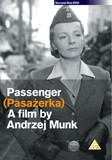| Reviews & Columns |
|
Reviews DVD TV on DVD Blu-ray 4K UHD International DVDs In Theaters Reviews by Studio Video Games Features Collector Series DVDs Easter Egg Database Interviews DVD Talk Radio Feature Articles Columns Anime Talk DVD Savant Horror DVDs The M.O.D. Squad Art House HD Talk Silent DVD
|
DVD Talk Forum |
|
|
| Resources |
|
DVD Price Search Customer Service #'s RCE Info Links |
|
Columns
|
|
|
Passenger
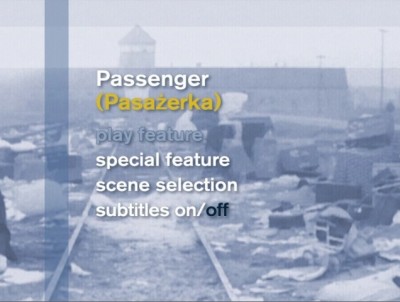
Passenger is constructed from scenes shot on location at the Auschwitz concentration camp bookended by still photographs shot aboard a cruise ship during location scouting. The still photographs are accompanied by narration supplied by Munk's collaborators which outlines what Munk may have intended to achieve from the shipboard scenes. Reminiscent of an early Chris Marker short, the snapshots and narration provide intriguing observations about the principal characters and their chance encounter, offering possibilities and food for thought but providing few answers. Though obviously strikingly different from what Munk would have provided, these snapshots and narration do not so much alter Munk's vision--which remains comfortably intact in the scenes shot at Auschwitz--as they do bracket it for our consideration.
Passenger is recounted from the perspective of Liza (Aleksandra Slaska), a German who's just returned to Europe for the first time in many years aboard a transatlantic cruise ship with her husband Walter, who's seeing Europe for the first time. At the first European port of call, Liza sees a woman board the ship that may be someone she hasn't seen in many years and whom she thought dead. It is then, for the first time in their marriage, that Liza confides in Walter that she was not a prisoner at Auschwitz as he'd believed, but rather she was a Nazi SS overseer there.
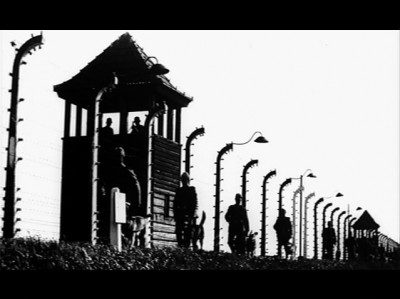 | 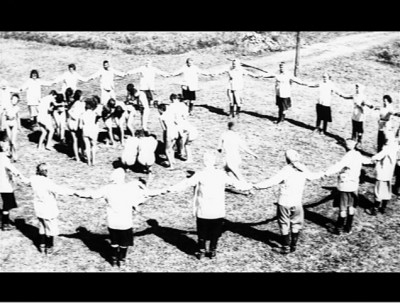 |
In her subsequent retelling of her time at the camp to her husband, Liza portrays herself as a victim of circumstance who never hurt anyone and who went out of her way to lessen the suffering of the prisoners whenever she could. If the woman she's seen is the Polish political prisoner Marta (Grazyna Staniszewska) whom she knew, Marta's only alive because of her intervention, Liza claims.
Liza proceeds to tell Walter a santized version of her time at Auschwitz, and specifically of her relationship with Marta. Liza was sent to Auschwitz in the summer of 1943. She took charge as the quartermistress of the storehouse outside the camp that inventoried the personel effects of the prisoners. She tried to help the female prisoners when she could, but had no direct authority over them - or so her story goes.
Upon assuming her post, Liza had to select an assistant from a new trainload of Polish political prisoners. The position was coveted by the prisoners because it was an easy assignment. Liza selected Marta because she felt sorry for the young woman who appeared vulnerable and childlike. Liza continued to nurture Marta, and took pleasure in seeing her transform back into a normal girl. When Liza discovered that Marta's fiancée Tadeusz was also a political prisoner interned at the camp, she arranged it so that Marta and Tadeusz could spend time together. Later, when Marta took ill, Liza arranged for her to get the best care available, thus saving her life.
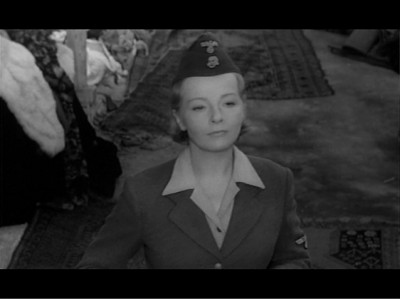 | 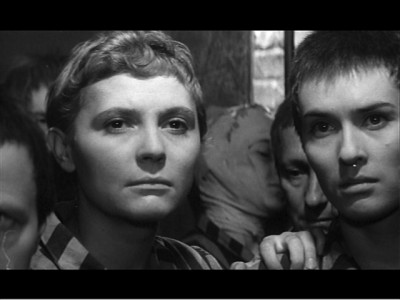 |
Despite all that Liza did for Marta she never gained Marta's trust. The more she did for Marta, the more Marta withdrew into herself. Liza never understood the depth of Marta's resistance until it was too late. Despite all her interventions on behalf of Marta and Tadeusz they were transferred to the camp's death block for subversive activities conducted within the camp. Despite her utmost wish to save Marta, there was nothing that Liza could do. Just before Liza was reassigned to Berlin she saw Tadeusz executed and visited Marta for the last time, assuming Tadeusz's fate would soon be Marta's too -- so concludes the sanitized story that Liza supplies her husband, Walter.
We do not know how Walter reacts to this story because Munk did not supply an answer. The narrator tells us that perhaps Walter felt sympathy for Liza and sought to reassure her, but whatever the reaction may have been it was inconsequential because the purpose of Walter was not to comfort or judge Liza, but rather to provide her a reason to recount her noble vision of her past, a version very different from the one she tells herself.
Just sixteen minutes of the 58 minutes of material assembled in the final cut of Passenger is consumed by Liza's noble vision of her past. The later three-quarters of the film takes up the darker version that Liza dares tell no one. This darker version is stripped of much of the kindness and excuses of the story told to Walter, but it is still a subjective truth colored by Liza's feelings about Marta; feelings Liza only partly seems to understand herself. Where the first story was tempered by cunning deception, the second is shaped by untested self-deception. Liza knows in her heart that she was not as beneficent as she portrayed herself to Walter, but she steadfastly refuses to fully weigh the morality of her actions against those of Marta. Liza fears what Marta knows about her past, but she doesn't accept the absolute moral claim of Marta's grievances against her.
Much of note is admitted by Liza only to herself. I omit recounting it all here not because it is inconsequential (far from it), but because it deserves to be experienced directly, unparsed. In viewing Liza's second story though do consider both what she admits to herself and what she fails to admit but which can easily be inferred. To give but one example, there's much more to be said about the motivation and particulars of Liza's involvement in Tadeusz's death than she admits even to herself. Giving full breath to this relationship alone could consume an entire essay, and this is but one of several elements buried within Liza's recollections that are far more weighty than Liza's recollection taken at face value suggests.
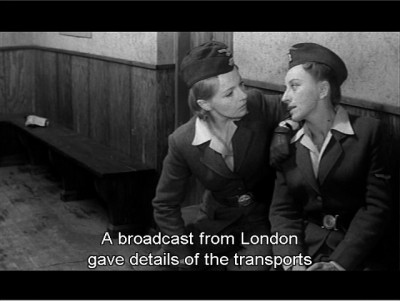 | 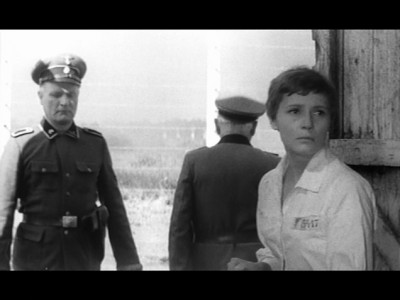 |
With its thematic focus on individual action, memory, and culpability, and striking cinematography that juxtapozes neo-realism with dramatically heightened imagery, Passenger is marked as a film grounded in the Polish Film School movement most frequently associated with the films of Andrzej Wajda. Many of the scenes of Passenger are unforgettable for their beauty which is frequently heartbreaking, absurd, or both.
Presentation
This review is of the European PAL-format release of Passenger from the UK-based boutique DVD label Second Run. This is the only DVD release of Passenger with English subtitles of which I'm aware.
Video:
Passenger is presented in 1.66:1 letterbox. Though the film was originally shot in Dyaliscope (2.35:1), no copies of that version were found in reasonable quality. According to Second Run's website, the 1.66:1 version was provided by the Polish National Archive and is the best quality version believed to be available anywhere without burnt in subtitles.
The version provided has some print damage as well as printing errors, most notably a sliver of information from the right side of the screen which appears on the left side throughout lengthy portions of the film. In addition to the problems with the print itself, there's one instance of severe digital macroblocking attributable to the digital transfer.
Despite these problems, Passenger looks acceptable given the financial realities of producing such a release for a limited audience. Though viewers should be aware of the problems with the image, they should not be dissuaded from seeing this remarkable film.
Audio:
This release is presented in a restored mono which is directed to the left and right front speakers. Audio quality on the main feature is generally very good, though there is considerable noise on the bonus feature. Note also that the audio levels are inconsistent between the main feature and supplementary feature as well.
Optional English subtitles accompanying the original Polish audio are well translated, and appropriately sized, paced, and placed.
Extras:
Extras on this release consist of a booklet featuring essays on the film and Munk by film scholar Ewa Mazierska and critic Stuart Klawans, and a 45-minute made-for-Polish-TV documentary entitled The Last Pictures (Ostatnie Zdjecia) by Andrej Brzozowski who served as Munk's assistant director on Passenger. Made in 2000, The Last Pictures is a tribute to the memory of Andrzej Munk which celebrates his impact on Polish cinema. Participants include directors Andrzej Wajda and Roman Polanski, cinematographer Krzysztof Winiewicz, and actresses Anna Ciepielewska and Aleksandra Slaska.
Final Thoughts:
Though a mere 58 minutes, Andrzej Munk's Passenger is a subtly complex film about the lies we tell others and those we tell ourselves, filled with as many moments of austere beauty as deep psychological insight. It's a landmark of the Polish Film School movement and an essential film of Holocaust cinema. This is a film that should be widely seen and discussed.
Though I anxiously await the day that a superior release of Passenger is available in the original aspect ratio, for now Second Run's release is very highly recommended.
|
| Popular Reviews |
| Sponsored Links |
|
|
| Sponsored Links |
|
|
| Release List | Reviews | Shop | Newsletter | Forum | DVD Giveaways | Blu-Ray | Advertise |
|
Copyright 2024 DVDTalk.com All Rights Reserved. Legal Info, Privacy Policy, Terms of Use,
Manage Preferences,
Your Privacy Choices | |||||||









